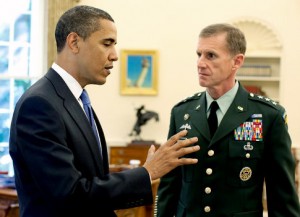Monday
Jun282010
Beyond Afghanistan: The US and the Poison of the "Long War" (Bacevich)
 Monday, June 28, 2010 at 6:12
Monday, June 28, 2010 at 6:12  UPDATE 0515 GMT: From Associated Press, via CBS News:
UPDATE 0515 GMT: From Associated Press, via CBS News:President Barack Obama said Sunday that there's "a lot of obsession" about the withdrawal date for U.S. troops from Afghanistan. He said his focus is on making sure the mission there is successful.
"I think that right now the debate surrounding Afghanistan is presented as either we get up and leave immediately because there's no chance at a positive outcome, or we stay basically indefinitely and do quote unquote whatever it takes for as long as it takes."
---
Andrew Bacevich writes for The Washington Post:
Long wars are antithetical to democracy. Protracted conflict introduces toxins that inexorably corrode the values of popular government. Not least among those values is a code of military conduct that honors the principle of civilian control while keeping the officer corps free from the taint of politics. Events of the past week -- notably the Rolling Stone profile that led to Gen. Stanley A. McChrystal's dismissal -- hint at the toll that nearly a decade of continuous conflict has exacted on the U.S. armed forces. The fate of any one general qualifies as small beer: Wearing four stars does not signify indispensability. But indications that the military's professional ethic is eroding, evident in the disrespect for senior civilians expressed by McChrystal and his inner circle, should set off alarms.
US Foreign Policy Video & Analysis: CIA Director Panetta from Afghanistan to Iran (27 June)
Earlier generations of American leaders, military as well as civilian, instinctively understood the danger posed by long wars. "A democracy cannot fight a Seven Years War," Gen. George C. Marshall once remarked. The people who provided the lifeblood of the citizen army raised to wage World War II had plenty of determination but limited patience. They wanted victory won and normalcy restored.
The wisdom of Marshall's axiom soon became clear. In Vietnam, Lyndon B. Johnson plunged the United States into what became its Seven Years War. The citizen army that was sent to Southeast Asia fought valiantly for a time and then fell to pieces. As the conflict dragged on, Americans in large numbers turned against the war -- and also against the troops who fought it.
After Vietnam, the United States abandoned its citizen army tradition, oblivious to the consequences. In its place, it opted for what the Founders once called a "standing army" -- a force consisting of long-serving career professionals.
For a time, the creation of this so-called all-volunteer force, only tenuously linked to American society, appeared to be a master stroke. Washington got superbly trained soldiers and Republicans and Democrats took turns putting them to work. The result, once the Cold War ended, was greater willingness to intervene abroad. As Americans followed news reports of U.S. troops going into action everywhere from the Persian Gulf to the Balkans, from the Caribbean to the Horn of Africa, they found little to complain about: The costs appeared negligible. Their role was simply to cheer.
This happy arrangement now shows signs of unraveling, a victim of what the Pentagon has all too appropriately been calling its Long War.
The Long War is not America's war. It belongs exclusively to "the troops," lashed to a treadmill that finds soldiers and Marines either serving in a combat zone or preparing to deploy.
To be an American soldier today is to serve a people who find nothing amiss in the prospect of armed conflict without end. Once begun, wars continue, persisting regardless of whether they receive public support. President Obama's insistence to the contrary notwithstanding, this nation is not even remotely "at" war. In explaining his decision to change commanders without changing course in Afghanistan, the president offered this rhetorical flourish: "Americans don't flinch in the face of difficult truths." In fact, when it comes to war, the American people avert their eyes from difficult truths. Largely unaffected by events in Afghanistan and Iraq and preoccupied with problems much closer to home, they have demonstrated a fine ability to tune out war. Soldiers (and their families) are left holding the bag.
Throughout history, circumstances such as these have bred praetorianism, warriors becoming enamored with their moral superiority and impatient with the failings of those they are charged to defend. The smug disdain for high-ranking civilians casually expressed by McChrystal and his chief lieutenants -- along with the conviction that "Team America," as these officers style themselves, was bravely holding out against a sea of stupidity and corruption -- suggests that the officer corps of the United States is not immune to this affliction.
To imagine that replacing McChrystal with Gen. David H. Petraeus will fix the problem is wishful thinking. To put it mildly, Petraeus is no simple soldier. He is a highly skilled political operator, whose name appears on Republican wish lists as a potential presidential candidate in 2012. Far more significant, the views cultivated within Team America are shared elsewhere.
Read rest of article....




